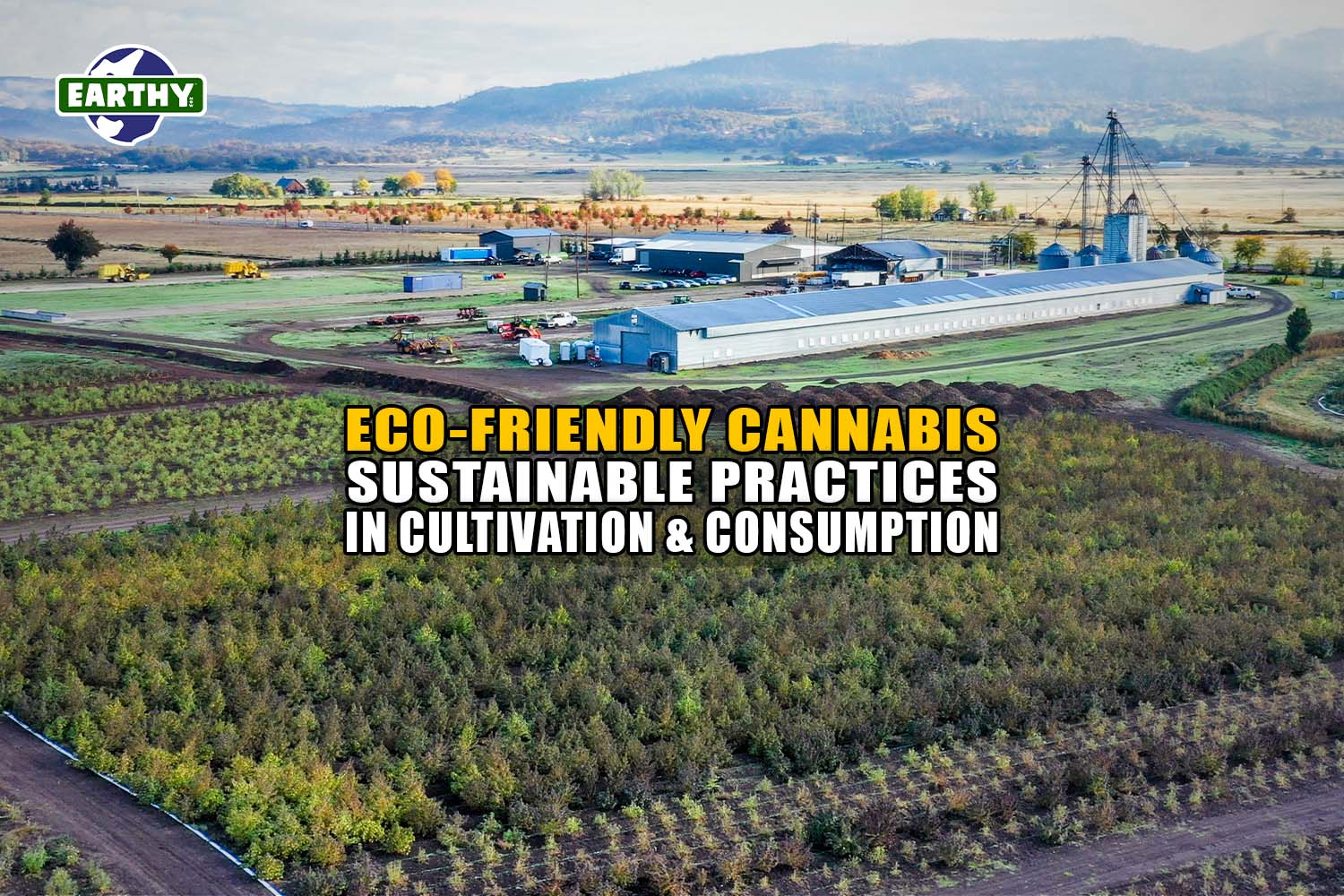As the cannabis industry continues to grow, so does its environmental footprint. However, the rise of legal cannabis has brought attention to the importance of adopting eco-friendly practices to minimize greenhouse gas emissions, reduce waste, and promote sustainability in cannabis cultivation and consumption. This article explores sustainable practices in the cannabis industry, highlighting how cannabis growers and companies can contribute to a greener future.
Growing marijuana and hemp sustainably
Organic farming
Organic farming plays a vital role in eco-friendly cannabis cultivation. For example, by avoiding synthetic pesticides and fertilizers, cannabis farmers can reduce water pollution and improve soil health. Notably, organic certification can help ensure that cannabis products meet stringent standards, promoting pesticide-free and environmentally friendly practices [1]. Thus, if you want to support eco-friendly practices, look for brands like Earthy Now that follow organic practices.
How is Organic Cannabis Harvested?
Water conservation techniques
Water conservation is essential in reducing the environmental impact of growing cannabis. For example, techniques like drip irrigation, rainwater harvesting, and recycling water in hydroponic systems help minimize water usage. Therefore, cultivators who use these practices contribute to sustainability, especially in areas prone to drought or water scarcity [2].
Energy efficiency
Energy consumption in indoor growing facilities remains a significant concern due to the reliance on artificial lighting and climate control systems. However, by using renewable energy sources, such as solar or wind power, along with energy-efficient LED lights, growers significantly reduce energy usage. Thus, smart climate control systems help maintain optimal growing conditions while minimizing energy consumption [3].
Soil health and management
Experts maintain that growers must prioritize soil health for sustainable cannabis cultivation. For example, practices like crop rotation, cover cropping, and composting improve soil fertility and prevent erosion. By promoting regenerative farming techniques, cannabis farmers can enhance soil quality and reduce the need for synthetic fertilizers [4].
Waste reduction
Increasingly, cannabis growers practice waste reduction during cannabis cultivation. For example, recycling and composting plant waste, as well as minimizing packaging waste, encourage more significant sustainability practices. Ultimately, implementing recycling programs for cannabis packaging, including eco-friendly packaging solutions like biodegradable and recyclable materials, reduces the industry’s environmental footprint [5].
Cannabis Cigarettes vs Traditional Smoking
Eco-friendly consumption
Sustainable packaging
Conscientious companies embrace sustainable packaging to reduce the environmental impact of cannabis products. For instance, using biodegradable and recyclable materials and reducing plastic packaging significantly lowers the amount of waste generated. Increasingly, eco-friendly packaging solutions, such as reusable containers and mylar bags, attract environmental-minded consumers [6].
Eco-conscious product choices
Consumers can support sustainability by choosing eco-friendly cannabis companies and products. This includes selecting edibles, tinctures, and topicals from companies like Earthy Now that prioritize sustainable practices. Earthy Now uses organic and pesticide-free cultivation methods that promote environmental responsibility so customers can feel good about supporting the environment.
Education and awareness
For many, the importance of sustainability in the cannabis industry remains crucial. Out of this conviction, individuals have initiated public health campaigns and community engagement initiatives to raise awareness about eco-friendly practices. As a result, the industry and community continue to drive demand for sustainable cannabis [7].
How to Choose the Right Wholesale CBD Supplier
Challenges and solutions
Regulatory barriers
Cannabis growers aiming to supplement sustainable practices often find it challenging to navigate state and federal regulations. However, advocating for environmentally friendly policies and working with state regulators helps create a more supportive regulatory environment. For example, the Sustainable Cannabis Coalition promotes sustainable practices and advocates for industry-wide change [8].
Cost implications
Cannabis farmers find it difficult to balance cost with sustainable practices. However, sustainable practices can lead to long-term savings and environmental benefits even if the initial investment may be higher. Also, incentives and subsidies for sustainable farming policies can help offset costs and encourage more growers to adopt eco-friendly practices [9].
Technological limitations and innovations
Emerging technologies play a significant role in promoting sustainability in cannabis cultivation. For example, innovations in energy-efficient lighting, climate control, and water management aim to reduce the industry’s environmental impact. Also, research and development in eco-friendly practices continue to advance sustainability potential in the cannabis industry [10].
The Future of Hemp Flower Wholesale: Predictions and Trends
Case studies and success stories
Leading sustainable cannabis companies
Several cannabis companies lead the way in sustainability. For example, Earthy Now and others reflect the commitment to eco-friendly practices, including using organic farming methods and sustainable packaging. Byers Scientific, another conscientious cannabis organization, focuses on reducing air pollution and improving energy efficiency in cannabis cultivation.
Innovative practices
Innovative practices in sustainable cannabis cultivation include the use of off-grid energy systems, cutting-edge climate control technologies, and advanced water recycling methods. Indeed, these practices not only reduce the environmental impact but also set a standard for other industries to follow [11].
Source your cannabis products from eco-friendly cannabis brands like Earthy Now
For cannabis enthusiasts seeking reliable, organic cannabis flower and other hemp-derived products, Earthy Now has something for everyone. These products are the industry’s cleanest and strongest, with only trace amounts of Delta-9 THC within the federally legal limit. Moreover, Earthy Now is committed to contributing to eco-friendly cannabis initiatives for a greener industry so you can feel especially good about your purchases.
Explore these natural, organic products from Earthy Now:
- CBD Flower
- Gummies
- Lozenges
- Tablets (THC Free!)
- Soothing Relief Lotion
- Soothing Relief Salve
- CBD Pet Tinctures (no THC!)
- Oils
- Pre-Rolls
- Smokes
- Terpenes
The future of environmentally-friendly cannabis
Trends and predictions
The future of eco-friendly cannabis looks promising, with emerging trends such as the increased use of renewable energy, advancements in sustainable packaging, and the adoption of regenerative farming techniques. As a result, the potential for sustainable practices in the industry grows and will hopefully become the new norm [12].
Why Earthy Now Stands Out In the CBD Flower Wholesale Market
Industry and consumer roles
Industry leaders and consumers both play crucial roles in promoting sustainability. For instance, cannabis companies like Earthy Now lead by example, implementing eco-friendly practices and advocating for sustainable policies. At the same time, consumers drive demand for sustainable products by supporting environmentally friendly brands that prioritize environmental responsibility [12].
Key takeaway: eco-friendly cannabis for a healthier planet
It’s essential for consumers and businesses to support eco-friendly cannabis to minimize the industry’s environmental impact. Ultimately, by adopting sustainable cultivation practices, reducing waste, and promoting eco-conscious consumption, cannabis growers and consumers help combat climate change and protect the environment. However, the industry’s future depends on the collective efforts of growers, companies, regulators, and consumers to embrace sustainability and ensure a greener future for all.
Visit Earthy Now and buy premium high-CBD, low-THC cannabis products that contribute to a greener world!
Medical Disclaimer / Legal Disclaimer – Information is provided for educational purposes. It does not and is not intended to constitute legal advice or medical advice. We attempt to be accurate and up-to-date, but the legality of cannabinoids and the science of cannabis are evolving. The author is neither a legal professional nor a medical expert. Before buying or using any products, you should check with your local authorities and medical providers.
References
- Organic Cannabis Growing: Tips for Sustainable Cultivation
- Best Cannabis Grow Operation Water Solutions
- Marijuana Growers Are Adopting an Energy-Saving Innovation
- Hemp Crop Rotation: Maximizing Yield and Soil Health
- What Is Sustainable Cannabis Waste Management?
- Sustainable Marijuana Packaging Solutions
- Examining the Push for Sustainability in the Cannabis Industry
- Highlighting the Disconnect Between Legislation and Sustainable Cannabis
- Embracing Sustainable Cannabis Cultivation
- Green Innovation: The Latest Sustainable Technologies in Cannabis Cultivation
- Sustainable Energy Solutions for Indoor Cannabis Growing
- Innovative Practices Shaping the Future of Cannabis
- Stages of Growing Cannabis
- Best Outdoor Grow Cannabis Setup
- Best Practices for Eco-Friendly Cultivation





